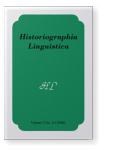Vol. 7:1/2 (1980) ► pp.39–52
Distinguo
Modi Significandi and Covert Case Roles
In this paper some basic ideas and terms employed by the Modistae are explained and exemplified, particularly the concepts of matter and form, act and potency, and then related to similar concepts in modern linguistics. The distinction of vox, dictio and pars orationis in modistic work is discussed and dictio is compared to Semitic triliteral roots. Neither can be part of spoken language. The distinctions of modes of being, modes of signifying and modes of existing are discussed, and it is pointed out that conceptions of language or linguistics can vary, depending on how the modes are employed. From this perspective, lexical decomposition is discussed, and the ability of language to abbreviate is cited as one of its most effective processes. The suggestiveness of analysing kill as cause/become/not/alive is compared with decomposition of other verbs, notably fetch and read. The proposed verbal classification of Case Grammar and especially the covert case roles are discussed. It is suggested that the perspective of the Modistae can help us see some problems here in a different light. In particular, analysis of reciprocal relations, found in forms like marry, exchange and swap lead to the proposal that the restriction on cases other than Object occurring more than once in a case frame needs reexamination.
Cited by (1)
Cited by 1 other publications
This list is based on CrossRef data as of 3 july 2024. Please note that it may not be complete. Sources presented here have been supplied by the respective publishers. Any errors therein should be reported to them.
